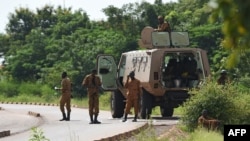A series of attacks by unidentified armed groups in Burkina Faso over the past 10 days has left 45 people dead and forced 17,500 people to flee their homes, the U.N. refugee agency says.
The UNHCR reports gunmen went on a rampage in three regions, burning down houses and shooting and killing civilians. It says they also ransacked health centers and damaged homes and shops.
UNHCR spokesman Boris Cheshirkov says he does not know what triggered the recent string of attacks.
"Clearly, one of the reasons is to cause mayhem and to torment the civilians, which now we see not only in Burkina, but across the Sahel-Chad Basin regions, especially in the last two years. And, in recent months, this has been fueling one of the worst and largest and fastest growing displacement and protection crises in the world," Cheshirkov said.
More than three million people are displaced across the Sahel region. Instability and surging violence in Burkina Faso, much of it blamed on Islamist insurgents, have forced more than 1.14 million people to flee their homes in search of safety in just over two years.
Cheshirkov says current trends point to more violence to come.
"Our teams are seeing an increasing trend of people fleeing towards larger, more secure urban centers," he said. "Most of the people who are arriving with few or no belongings, some have been generously welcomed by host families, while others have sought refuge in public buildings such as schools and other temporary shelters. They are in need of urgent food, shelter, and clean water, and health care."
Cheshirkov says aid workers are registering new arrivals and providing psychological support and shelter. He says the needs are great and funds are too low to meet the task, as the UNHCR has received only 22 percent of its $91.6 million appeal for life-saving humanitarian operations this year.




